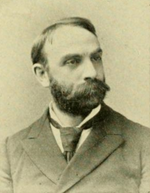Albert Enoch Pillsbury | |
|---|---|
 | |
| 17th Massachusetts Attorney General | |
| In office 1891–1894 | |
| Governor | William E. Russell |
| Preceded by | Andrew J. Waterman |
| Succeeded by | Hosea M. Knowlton |
| President of the Massachusetts Senate | |
| In office 1885–1886 | |
| Preceded by | George A. Bruce |
| Succeeded by | Halsey J. Boardman |
| Member of the Massachusetts Senate from the 6th Suffolk district | |
| In office 1884–1886 | |
| Member of the Massachusetts House of Representatives | |
| In office 1876–1878 | |
| Personal details | |
| Born | August 19, 1849 Milford, New Hampshire |
| Died | December 23, 1930 (aged 81) Newton, Massachusetts |
| Political party | Republican |
| Spouse(s) | Louisa Fuller (Johnson) Wheeler, m. July 9, 1889. Elizabeth Mooney, m. July 1, 1905 |
| Children | Elizabeth Dinsmoor, b. July 21, 1907 Parker Webster, b. March 17, 1910 |
| Alma mater | Lawrence Academy, Harvard College class of 1871 |
| Profession | Attorney |
| Signature |  |
| [1][2][3][4][5] | |
Albert Enoch Pillsbury (August 19, 1849 – December 23, 1930) was a Boston lawyer who served in both houses of the Massachusetts legislature, president of the Massachusetts State Senate, and as the Attorney General of Massachusetts from 1891 to 1894. In addition to being a member of the National Negro Committee, the precursor to the NAACP, Pillsbury was a member of the Boston Committee to Advance the Cause of the Negro, which in 1911 became a branch of the NAACP. It was Pillsbury who drafted the bylaws of the NAACP. In 1913, he resigned his membership in the American Bar Association when that organization rejected the membership of William H. Lewis, a black assistant U.S. attorney and supporter of Booker T. Washington. In 1913, Pillsbury was awarded an honorary LL.D. degree from Howard University. It was there he delivered his speech illuminating, defending and praising President Lincoln's role in ending slavery that became a small book, Lincoln and Slavery.[6]
- ^ Barnes, Albert Mallard (1921), Report of the secretary of the class of 1871 of Harvard college, Issue 11, Cambridge, MA: The Riverside Press, p. 134
- ^ Toomey, Daniel P. (1892), Massachusetts of Today: a Memorial of the State, Historical and Biographical, Boston, MA: Columbia Publishing Company, p. 30
- ^ "A. E. Pillsbury Dies; A Bay State Leader; Former Attorney General Was President of Massachusetts Senate in 1885-86. Practiced Law 50 Years; He Was Candidate for Governor in 1893 but Withdrew From Race-- Was 81 Years Old". The New York Times. December 24, 1930. p. 10. Retrieved December 1, 2009.
- ^ Journal of the Constitutional Convention of the Commonwealth of Massachusetts, Massachusetts Constitutional Convention, Boston, MA: Wright & Potter printing co., state printers, 1919, p. 626
- ^ Journal of the Constitutional Convention of the Commonwealth of Massachusetts, Massachusetts Constitutional Convention, Boston, MA: Wright & Potter printing co., state printers, 1919, p. 11
- ^ Jager, Ronald and Grace Jager, Historical Pillsbury, Friends of Pillsbury State Park, 1976